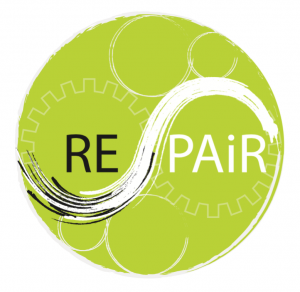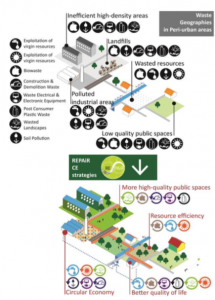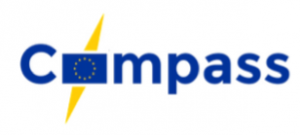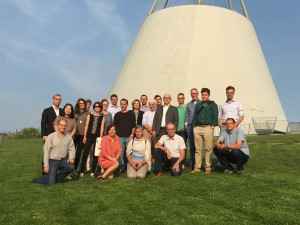Ongoing projects
 Interreg Europe WaVE
Interreg Europe WaVE
SPS team members (Kasia Piskorek, Ana Maria Fernandez Maldonado, Marcin Dąbrowski, with Wout van den Toorn Vrijthof and Vincent Nadin as external advisors) are involved in Interreg project WaVE – WAter-linked heritage Valorization by developing an Ecosystemic approach. The project runs from 1 Aug 2019 to 31 Jul 2022.
 WaVE brings together 7 partners who have in common a rich history of cultural heritage that has been formed through an interaction with water. The project, funded by the Interreg Europe program with €1,516,007 under the theme ‘Environmental and resource efficiency’, is led by the city of Breda (Netherlands), the Italian Research Institute CertiMaC, as well as the Italian city of Ravenna and the Danish city of Aarhus, the Valencian Province of Alicante (Spain) and the Hungarian-Slovak region of Ister-Granum. TU Delft is a knowledge partner, providing methodologies, guidance, feedback and coordination of knowledge exchange between the project partners. In particular, our focus in the project is above on advising the partners on stakeholder engagement and transfer of knowledge and good practice across the 5 cases.
WaVE brings together 7 partners who have in common a rich history of cultural heritage that has been formed through an interaction with water. The project, funded by the Interreg Europe program with €1,516,007 under the theme ‘Environmental and resource efficiency’, is led by the city of Breda (Netherlands), the Italian Research Institute CertiMaC, as well as the Italian city of Ravenna and the Danish city of Aarhus, the Valencian Province of Alicante (Spain) and the Hungarian-Slovak region of Ister-Granum. TU Delft is a knowledge partner, providing methodologies, guidance, feedback and coordination of knowledge exchange between the project partners. In particular, our focus in the project is above on advising the partners on stakeholder engagement and transfer of knowledge and good practice across the 5 cases.
 WaVE is the project that seeks to utilise and revalue heritage on and around water. The partners thus not only want to preserve and further develop heritage and nature, but also expect side effects such as socio-economic growth and climate adaptation. The focus is on the improvement of regional and local policies to open up their possibilities for supporting the development of integrated adaptive reuses of water-linked cultural heritage sites in human settlements.
WaVE is the project that seeks to utilise and revalue heritage on and around water. The partners thus not only want to preserve and further develop heritage and nature, but also expect side effects such as socio-economic growth and climate adaptation. The focus is on the improvement of regional and local policies to open up their possibilities for supporting the development of integrated adaptive reuses of water-linked cultural heritage sites in human settlements.
 The WaVE’s goal is to improve the overall support by the addressed policy instruments for integrated valorisation approaches of cultural heritage, to sparkle ideas for the creation of new projects aiming at integrated valorisation of water-linked cultural heritage, and to raise awareness for the subject at other cities and regions in Europe.
The WaVE’s goal is to improve the overall support by the addressed policy instruments for integrated valorisation approaches of cultural heritage, to sparkle ideas for the creation of new projects aiming at integrated valorisation of water-linked cultural heritage, and to raise awareness for the subject at other cities and regions in Europe.
Through a joint work of interregional knowledge sharing, learning, transmitting Good Practices and Engaging with local Stakeholders, we will define Action Plans to tackle the subject-matter.
3 fundamental stages will lead us to our goal: ANALYSIS, KNOWLEDGE SHARING and PLANNING .
Stage 1 focuses on assessing each region’s current status of water-linked cultural heritage valorisation based on a joint “Methodology for Regional Status-Quo and Good Practice identification”, prepared by TU Delft team.
Read the Regional Status-Quo Methodology
Stage 2 represents the “heart” of the project’s interregional learning process. All partners will be involved in a process of knowledge sharing, joint learning and exchange of good practices. Three day long Interregional Knowledge Exchange Sessions (IKES) will be organised in presence of stakeholders. The IKES meeting will consist of in-depth discussions using workshop method and visits to identified good practices-sites.
Read the IKES Methodology prepared by TU Delft team.
Stage 3 revolves around drafting Action Plans to tackle the subject-matter, in order to create structural changes within local and regional policies and work on new projects for the development of sites.
H2020 REPAiR
 The H2020 Research & Innovation Action project REPAiR (REsource Management in Peri-urban Areas: Going Beyond Urban Metabolism) led by Alexander Wandl and Prof. Arjan van Timmeren of the Urbanism Department, chair of Environmental Design and Technology, shall receive 5 million Euros funding from the H2020 programme.
The H2020 Research & Innovation Action project REPAiR (REsource Management in Peri-urban Areas: Going Beyond Urban Metabolism) led by Alexander Wandl and Prof. Arjan van Timmeren of the Urbanism Department, chair of Environmental Design and Technology, shall receive 5 million Euros funding from the H2020 programme.
The project will develop and implement a tool that helps local and regional authorities reduce waste flows in peri-urban areas. As the coordinator of the project, 1.4 million of the fund will befall on TU Delft, of which 1.2 million shall be dedicated to the scientific effort at the faculty, led by the Urbanism Department.
A shift towards a more circular economy is crucial to achieve more sustainable and inclusive growth. The REPAiR project will provide a geodesign decision support environment (GDSE). This environment will assist local and regional authorities in reducing waste flows by helping them create integrated spatial development strategies that are both specific for the place at hand, transdisciplinary and eco-innovative. The GDSE will be developed and implemented in ‘living labs’ in six metropolitan areas, namely Naples, Ghent, Hamburg, Pécs, Łódź and Amsterdam.

The scientific team, led by Arjan van Timmeren and Alex Wandl, consists of the following members from different departments of the faculty:
Department of Urbanism
- Prof. dr. Arjan van Timmeren (Environmental Technology & Design)
- Dipl.-Ing. Alexander Wandl, MSc (Environmental Technology & Design)
- Dr. Marcin Dąbrowski (Spatial Planning & Strategy)
- Dr. Libera Amenta (Environmental Technology & Design)
Department of Architectural Engineering +Technology
- Ir. Bob Geldermans
Department of Management in the Built Environment
- Dr. Hilde Remoy
- Dr. Erwin Heurkens
Dr. Ni Yan will be the project manager for financial and legal management and coordination of this project.
Project partners are from academia, industry and public administration, which include: Ghent University (BE), DiARC UNINA – University of Naples Federico II (I), HafenCity Universität Hamburg (D), Institute for Regional Studies, CERS of HAS, MTA KRTK (H), Institute of Geography and Spatial Organization Polish Academy of Sciences (PL), Joint Research Centre (I), Geo-Col GIS and Collaborative Planning (NL), Delta Development Group (NL), BIOKOM Nonprofit Ltd (H), Gertz Gutsche Rümenapp Stadtentwicklung und Mobilität GbR (D), OVAM – Public Waste Agency of Flanders (BE), Municipality of Haarlemmermeer (NL), Campania Regional Authority (I), Pheno horizon (PL), Bauer Umwelt GmbH (D), IVAGO (BE), Stadtreinigung Hamburg (D).
Some of our past projects

COHESIFY
The COHESIFY project funded by the Horizon2020 Framework Programme for Research and Innovation is investigating whether people in Europe are aware of the EU’s Regional Policy programmes or projects in their regions and in how far they identify with the EU. In particular, the project investigates how, on the one hand, (1) the ways in which the funding is used and its results communicated, and, on the other hand, (2) the characteristics of the regions where it is used (territorial, socio-economic, institutional), affect the ways in which citizens perceive the EU.
For two years, a consortium of 8 partner universities across Europe and 2 SMEs – among them a team from the TU Delft’s Faculty of Architecture and the Built Environment (Urbanism and OTB) – is conducting multi-disciplinary research on the topic. In the current context of Brexit and discussions on the future of Cohesion Policy at European level, the project is very much needed to give orientation and guidance to politicians and policy-makers at the European, national and regional levels. One of the main objectives is to better understand the relationship between the levels of EU-funding received in certain regions and the level of support to the European Union achieved. For example, Wales and Cornwall in the United Kingdom, is a relatively peripheral region that lags in economic development, and thus also one of the so-called “net-beneficiary regions”, receiving more money from the European Union’s Cohesion policy funds than what it pays. Despite this, the Welsh and Cornish citizens have voted “leave” this summer. Why? Has the use of the EU funds been ineffective or perhaps have the results gone unnoticed by the wider public? With nationalism on the rise in many European countries, there is a growing concern whether the European Union is still reaching its citizens today and whether the money is well spent in this respect. Therefore, one of the fields of interest will also be to analyse the communication campaigns on EU Regional funding that were conducted in numerous regions.
TU Delft COHESIFY team: Marcin Dąbrowski, Ana Maria Fernandez Maldonado, Bardia Mashhoodi (Chair of Environmental Technology & Design), Prof. Vincent Nadin, Roberto Rocco, Marjolein Spaans (OTB), Dominic Stead, Prof. Wil Zonneveld.
http://www.cohesify.eu/media/ )
COMPASS
 The first comprehensive comparative analysis: the EU Compendium of Spatial Planning Systems and Policies was published by the European Commission in 1997. Subsequent studies have to a greater or lesser degree updated the findings of the Compendium. Since then the number of EU member states has nearly doubled, the territorial dimension of EU sector policies has deepened, and there have been many, sometimes radical, reforms of systems territorial governance and spatial planning across Europe. To some extent these reforms have been stimulated and informed by EU initiatives, notably the European Spatial Development Perspective the Territorial Agenda 2020 and other EU sectoral policies, such as EU Cohesion Policy, environmental policy or the Common Agricultural Policy. Territorial governance and spatial planning systems have been changing in response to wider global trends, from the dominance of neoliberal policies, societal shifts towards individualism replacing collective action in societies; the growing awareness of climate change risks to the fallout from the financial crisis and austerity programmes unfolding since 2008. As a result of all these trends and reforms, the relationship between EU policies and territorial governance and spatial planning in the member states remains uncertain, even though there is arguably strong demand for more effective territorial governance and more place-based EU interventions in line with the specificities and needs of the different territories across the EU. In other words, there is a particular need to review the relationship between territorial governance, spatial planning and EU policies with a territorial dimension, especially EU cohesion policy. Spatial planning should help to combine actions in particular places to achieve more effective results. Is this happening in practice however? How these linkages vary across the very differentiated and changing planning contexts in Europe?
The first comprehensive comparative analysis: the EU Compendium of Spatial Planning Systems and Policies was published by the European Commission in 1997. Subsequent studies have to a greater or lesser degree updated the findings of the Compendium. Since then the number of EU member states has nearly doubled, the territorial dimension of EU sector policies has deepened, and there have been many, sometimes radical, reforms of systems territorial governance and spatial planning across Europe. To some extent these reforms have been stimulated and informed by EU initiatives, notably the European Spatial Development Perspective the Territorial Agenda 2020 and other EU sectoral policies, such as EU Cohesion Policy, environmental policy or the Common Agricultural Policy. Territorial governance and spatial planning systems have been changing in response to wider global trends, from the dominance of neoliberal policies, societal shifts towards individualism replacing collective action in societies; the growing awareness of climate change risks to the fallout from the financial crisis and austerity programmes unfolding since 2008. As a result of all these trends and reforms, the relationship between EU policies and territorial governance and spatial planning in the member states remains uncertain, even though there is arguably strong demand for more effective territorial governance and more place-based EU interventions in line with the specificities and needs of the different territories across the EU. In other words, there is a particular need to review the relationship between territorial governance, spatial planning and EU policies with a territorial dimension, especially EU cohesion policy. Spatial planning should help to combine actions in particular places to achieve more effective results. Is this happening in practice however? How these linkages vary across the very differentiated and changing planning contexts in Europe?
ESPON Applied Research project Comparative Analysis of Territorial Governance and Spatial Planning Systems in Europe (COMPASS), coordinated by Prof. Vincent Nadin, seeks to address those issues. It takes stock of the trends in territorial governance and spatial planning systems across Europe and explores the linkages and cross-fertilisation potential between them and EU Cohesion Policy. The COMPASS Consortium has been constructed so as to provide expertise in all relevant aspects of territorial governance and spatial planning, and ‘hands-on’ experience of spatial planning in all the countries under study. The Consortium comprises 8 partners and 17 sub-contractors.
 COMPASS is the first comprehensive research on European spatial planning since 1997 when 15 countries were included in the EU Compendium. It covers 39 countries – the 28 member states of the EU, the four EFTA countries and seven candidate and other countries.The project will produce:
COMPASS is the first comprehensive research on European spatial planning since 1997 when 15 countries were included in the EU Compendium. It covers 39 countries – the 28 member states of the EU, the four EFTA countries and seven candidate and other countries.The project will produce:
- A comprehensive comparative analysis of territorial governance and spatial planning systems, including all 28 EU Member States plus the four ESPON Partner States, with a possible extension to the EU candidate countries and other countries of the Western Balkans.
- Qualitative analysis of the praxis of spatial planning and territorial governance and the relationship, in practice, between strategies and outcomes.
- In-depth analysis of the role of EU Cohesion Policy and other macro-level EU policies in shaping territorial governance and spatial planning systems and their impacts in concrete practice – and the in uence of territorial governance and spatial planning on EU sectoral policies.
- In-depth case studies of good practice in cross- fertilising EU Cohesion Policy and spatial planning, including a focus on cross-border/transnational case(s).
- Pan-European maps illustrating the key findings.
- Recommendations on the potential role of spatial planning in shaping the future of EU Cohesion Policy and on ways to generate synergies between national territorial development policies and EU Cohesion Policy, as well as other macro-level EU policies.
TU Delft COMPASS team:
Prof. Vincent Nadin, Prof. Wil Zonneveld, Assoc. Prof. Ana Maria Fernández Maldonado, Assoc. Prof. Dominic Stead, Asst. Prof. Marcin Dabrowski, Dr. Nikki Brand, Dr. Kasia Piskorek, Dr. David Evers (PBL), Ir. Xiaolan Lin, MSc.
